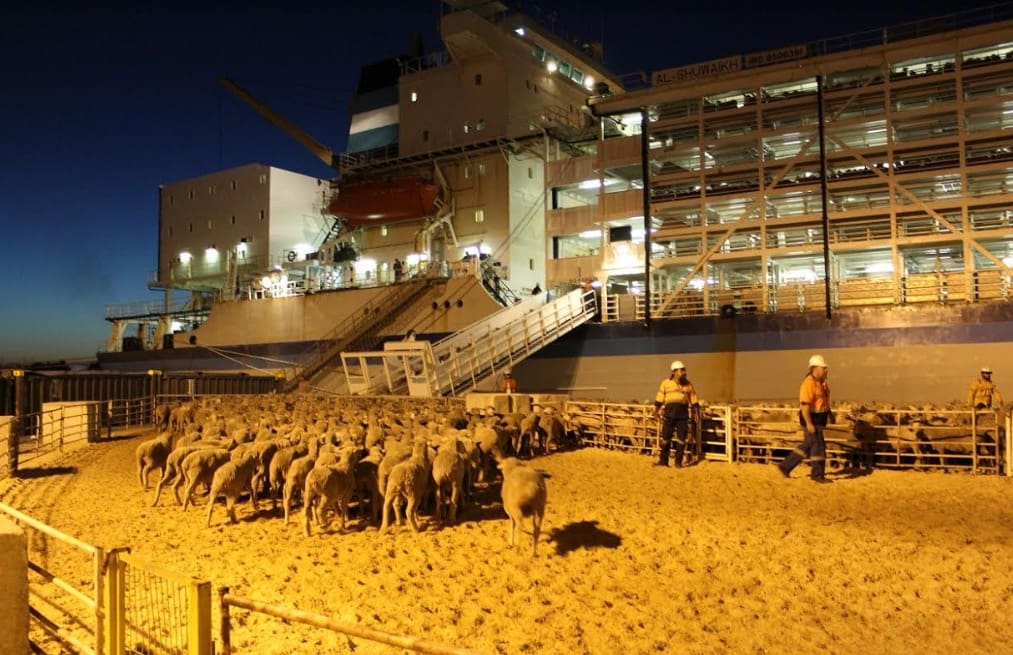
Loading sheep on the Al Shuwaikh
LIVE sheep exporters are divided over the Federal Government’s plans to grant exemptions for twin-tiered vessels to operate past a January 2020 deadline.
Twin-tiered live export vessels were set to potentially retired from January 1 next year, with all vessels being required to meet an air velocity requirement of 0.5 metres/second.
However, the government has confirmed it will consider potential exemptions from requirements under Marine Order 43 (Cargo and cargo handling – livestock) 2018 for twin-tier vessels used to export live sheep. This would allow the operation of these vessels beyond 1 January 2020.
The timely concession has been welcomed by the largest live sheep shipper from Australia, Kuwait Livestock Transport and Trading, which operates the two-tiered vessel the Al Shuwaikh.
“KLTT welcomes the additional time to transition to new arrangements,” a KLTT spokesman said.
The company believes the animal welfare concerns of two-tiered vessels have largely been addressed by the advent of lower stocking densities and the moratorium on shipments during the northern summer. The Australian Maritime Safety Authority is yet to approve the exemption applications of KLTT and the other twin-tiered vessel operator and exporter Livestock Shipping Services. LSS operates the two-tiered vessel, the MV Maysora.
The concession is expected to be opposed by animal welfare groups and has also angered Western Australian-based exporter Wellard, with company executive chairman John Klepec claiming it risks the long-term sustainability of the live sheep industry and the farmers that rely on it.
“The Federal Government’s decision to force single tiered vessels to meet minimum air velocity standards while awarding double tiered vessels an ongoing holiday is contrary to good animal welfare so risks the long term sustainability of the live sheep industry and the farmers that rely on it.
“Back in 2006, after assessing the minimum ventilation requirement to achieve acceptable animal welfare outcomes, AMSA imposed a minimum ventilation requirement of 0.5 metres/second,” Mr Klepec said.
“It is unfathomable that 13 years later double tiered vessels are being specifically exempted from this minimum requirement while single tiered vessels, which provide numerous other animal welfare benefits, must comply.
Mr Klepec said many vessel owners, including Wellard, have invested large amounts of money to upgrade ventilation systems or improve ventilation design to meet the new standards and reduce risks to animal welfare.
“Vessel owners who have chosen not to invest in upgrading their vessels up to the minimum standard now have a commercial advantage by being granted these special privileges.
“Frankly, that’s a perverse outcome and contrary to the Australian public’s expectation and the long-term future of a trade that can ill-afford another animal welfare incident,” he said.
Mr Klepec said the distressing events in Romania last week are an incredibly sad but salient reminder what can happen when old vessels are allowed to operate with insufficient standards to protect sheep welfare.
“Australia was the benchmark standard for live export but this retrograde action undermines the progress achieved.
“The Agriculture Minister and the Minister for Transport must go back to Plan A, where from 1 January 2020 all vessels, whether they be double or single tier, must meet the 0. 5 metres/second air velocity requirement and double tier vessels are banned.”
Mr Klepec said single-tiered vessels have numerous animal welfare benefits, including significantly improved ventilation, enhanced identification of sick, diseased and injured animals, and easier access to pens to treat and retrieve sick animals
A Department of Agriculture spokesperson said applications for the temporary and limited exemptions will be assessed on a case-by-case basis and must be made to the Deputy Prime Minister and Minister for Infrastructure, Transport and Regional Development, Michael McCormack.
“Vessel operators will need to justify why they are unable to comply with legislated deck height and ventilation requirements, and submit a plan to meet the Marine Order 43 requirements in the near future (for further detail about the MO43 requirements contact the Department of Infrastructure).
“As a condition of any exemptions granted, exporters who use these vessels to export live sheep will need to have an approved management plan agreed to by the Department of Agriculture to support acceptable animal welfare outcomes,” the spokesperson said
The spokesperson said animal welfare management plans for twin-tier vessels will need to address the constraints associated with these vessels, including ventilation and the difficulty in observing the stock and removing sick animals for treatment.
“To address animal welfare concerns, the management plans may include additional conditions such as increased space allocation for sheep, more active on board management and environmental monitoring and additional pre-voyage preparation and stock selection measures.”
Wilkie introduces export ban bill
The advent of the twin-tier vessel exemptions comes as independent Member for Clark, Andrew Wilkie, introduced another Private Members Bill to wind down the live export trade today.
It is the fourth time Mr Wilkie has attempted to introduce the Live Animal Export Prohibition (Ending Cruelty) Act 2019, which aimed to prohibit the export of live animals for slaughter from 1 July 2022 and establish additional interim animal welfare safeguards.

Of course, these dreadful old vessels are getting an exemption. AMSA will be forever known for how easy it is to be leaned on.
Let’s see what the IMO’s sulphur cap regulations bring. But then, AMSA might be leaned on to not enforce those either.